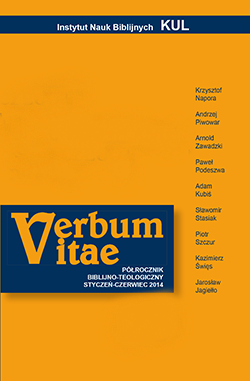Praca w życiu chrześcijanina. Stanowisko św. Jana Chryzostoma
Work in the Life of a Christian. St. John Chrysostom’s Position
Author(s): Piotr SzczurSubject(s): Christian Theology and Religion
Published by: Katolicki Uniwersytet Lubelski Jana Pawła II - Wydział Teologii
Keywords: John Chrysostom; work; farmers; craftsmen; merchants; slaves
Summary/Abstract: This article is a presentation of St. John Chrysostom’s social teaching on the value of work. This teaching is grounded in the Holy Scriptures. By describing Christ and certain biblical figures (e.g. St. Paul) as people of work, Chrysostom underscores the meaning and value of labor. He does so contrary to the opinion of the wealthy in the Antioch society, who despised both the physical labor and the people performing it. In the teaching of the Archbishop of Constantinople, physical work is a cooperation with God in the effort of transforming the world. It is an element which ennobles a human being, provides him with the means necessary to support his life and enabling him to undertake the works of mercy. St. John also highlights the difficult situation of many peasants, craftsmen and merchants, and in this way he tries to direct the attention of the wealthy to this social problem. It can be deduced from Chrysostom’s writing that the life of slaves, which constituted a large portion of the late antique society, was generally modest and filled with work – especially the most onerous one. In giving instructions to slaves, St. John admonishes them to be submissive to their masters and do their work well. In speaking to the masters, however, he recommended that their relationships with slaves were humanitarian and shaped according to the Gospel. It is noteworthy to see that the element of love of one’s neighbor (philanthropy) and forgiving mercy brought new quality into the social structures of the time, especially between a master and a slave.
Journal: Verbum Vitae
- Issue Year: 2014
- Issue No: 25
- Page Range: 171-201
- Page Count: 31

